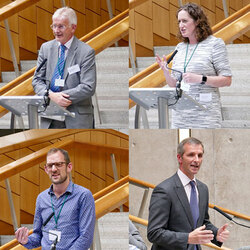
On Wednesday 14th June 2017, the Scottish Parliament heard from a Dane who works for the Nordic Council of Ministers about “New Nordic Food”. The event, titled ‘Food: a solution to a health crisis’ was organised by Obesity Action Scotland with the Scottish Food Coalition.
Liam McArthur MSP sponsored the event and gave a warm and clever introduction. Among the guests were MSPs, Nourish, RSPB, Federation of City Farms and Community Gardens, Cancer Research UK, Alcohol Focus Scotland, SPICe, Food Standards Scotland, NHS Health Scotland, Rowett Institute, Glasgow University and many others.
Mads Frederik Fischer-Moller who is a Senior Advisor on Food, provided illuminating views on Nordic food culture, nutrition policy and the impact of food programmes and activities in the Nordic Countries. The aim was to solve the problem of poor diet and to create a food culture and identity for Nordic food.
Government policies played a key role in promoting a new and more sustainable Nordic cuisine to international fame but others played their part including world renowned chefs and the private sector.
Through public-private partnerships, product innovations and reformulation these new ideas are being incorporated in everyday life in the Nordic countries.
Liam McArthur MSP sponsored the event and gave a warm and clever introduction. Among the guests were MSPs, Nourish, RSPB, Federation of City Farms and Community Gardens, Cancer Research UK, Alcohol Focus Scotland, SPICe, Food Standards Scotland, NHS Health Scotland, Rowett Institute, Glasgow University and many others.
Mads Frederik Fischer-Moller who is a Senior Advisor on Food, provided illuminating views on Nordic food culture, nutrition policy and the impact of food programmes and activities in the Nordic Countries. The aim was to solve the problem of poor diet and to create a food culture and identity for Nordic food.
Government policies played a key role in promoting a new and more sustainable Nordic cuisine to international fame but others played their part including world renowned chefs and the private sector.
Through public-private partnerships, product innovations and reformulation these new ideas are being incorporated in everyday life in the Nordic countries.
Over the past 10 years the Nordic governments have collectively taken a new approach that seeks to change the food culture and consumption patterns of their people.
What does it mean?
As Mads explained, if you visited a friend in the Nordics ten years ago you would most likely be served spag bol for dinner. Today, you would be proudly given fresh, seasonal, locally sourced produce.
The Nordic countries have seen the results already. Consumption of wholegrain products and traditional vegetables like cabbage and carrots are on the rise, with cabbage in hot-dog buns being extremely popular at music festivals. Moreover, salads are challenging hotdogs as the favourite fast food option and markets for local and organic products are growing 10% annually.
Food is now the 2nd top reason to visit Nordic countries, right after nature. Ten years ago it was not even in the top 3. The restaurant Noma in Denmark has been voted the best restaurant in the world for four out of the last seven years. This massive change of perception brought with it not only improvement in health of the nation but also generated jobs. In Copenhagen over six thousand jobs were created in food businesses alone since 2009. This shift also translates to the development of rural areas, increased number of tourists and small business growth.
The Nordics have made a change: they focus on pleasure and gastronomy but based on strong nutritional recommendations. What were Mads key recommendations? Build trust-based partnerships between industry, government and NGOs. Change the food culture to give consumers and businesses something to aspire to.
The Nordics set out to deliver a vision of “New Nordic Food”. If our vision is to be a “Good Food Nation” then to truly own that term we must prioritise action to ensure a healthy diet for everyone in Scotland.
What does it mean?
As Mads explained, if you visited a friend in the Nordics ten years ago you would most likely be served spag bol for dinner. Today, you would be proudly given fresh, seasonal, locally sourced produce.
The Nordic countries have seen the results already. Consumption of wholegrain products and traditional vegetables like cabbage and carrots are on the rise, with cabbage in hot-dog buns being extremely popular at music festivals. Moreover, salads are challenging hotdogs as the favourite fast food option and markets for local and organic products are growing 10% annually.
Food is now the 2nd top reason to visit Nordic countries, right after nature. Ten years ago it was not even in the top 3. The restaurant Noma in Denmark has been voted the best restaurant in the world for four out of the last seven years. This massive change of perception brought with it not only improvement in health of the nation but also generated jobs. In Copenhagen over six thousand jobs were created in food businesses alone since 2009. This shift also translates to the development of rural areas, increased number of tourists and small business growth.
The Nordics have made a change: they focus on pleasure and gastronomy but based on strong nutritional recommendations. What were Mads key recommendations? Build trust-based partnerships between industry, government and NGOs. Change the food culture to give consumers and businesses something to aspire to.
The Nordics set out to deliver a vision of “New Nordic Food”. If our vision is to be a “Good Food Nation” then to truly own that term we must prioritise action to ensure a healthy diet for everyone in Scotland.
